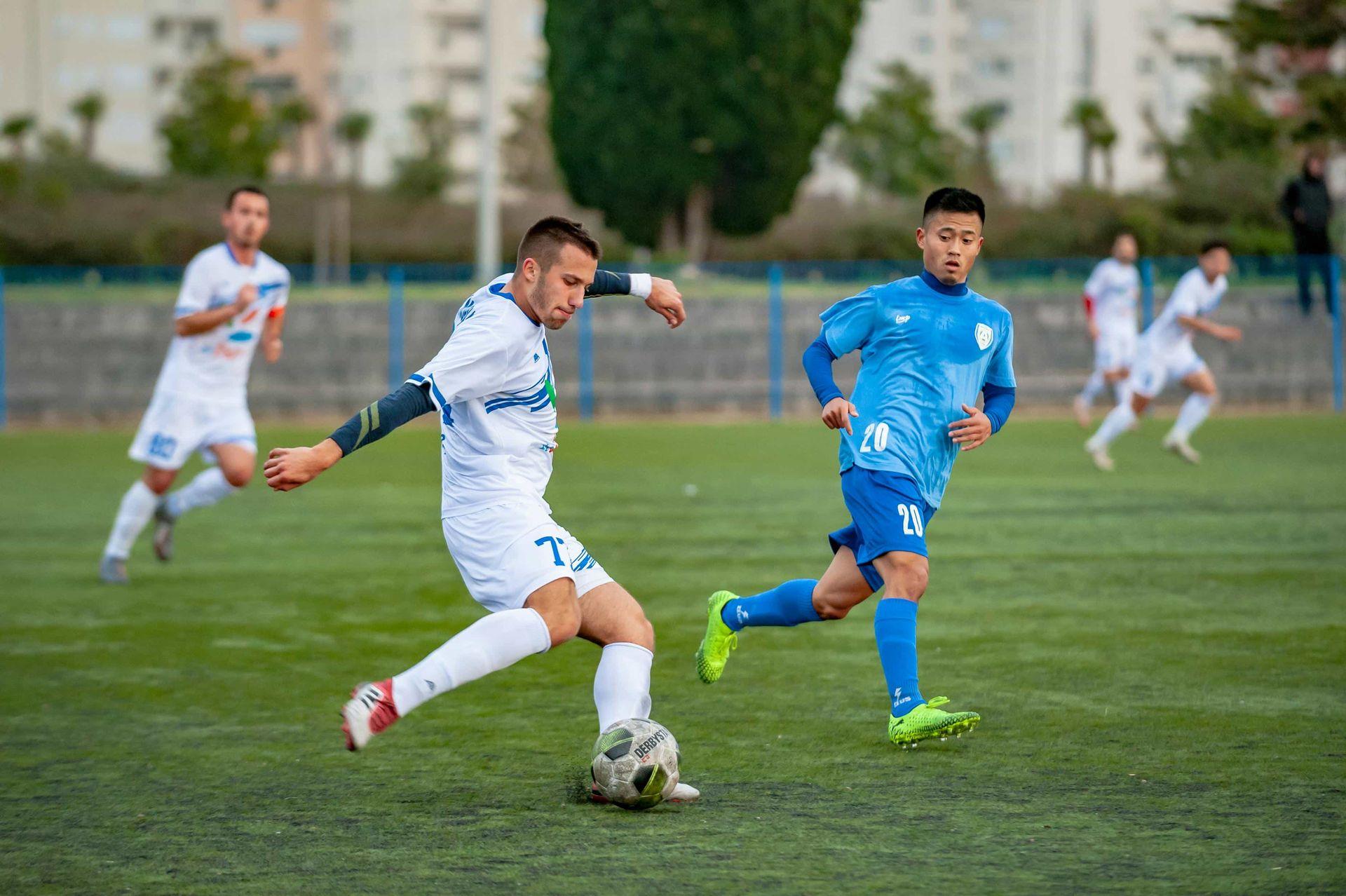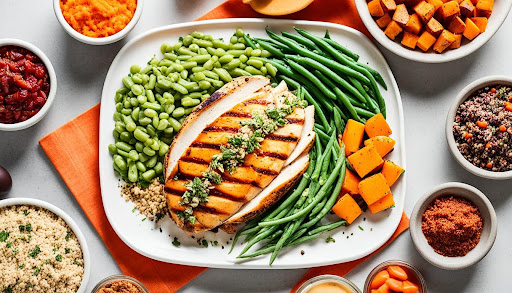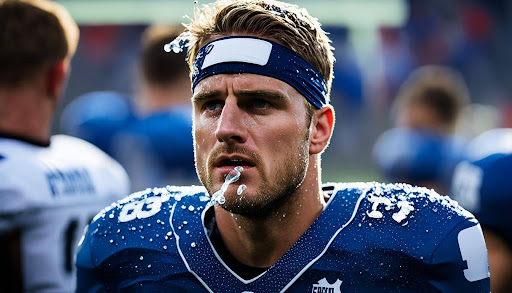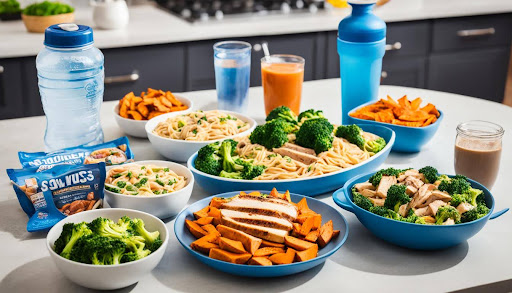Nutrition Guide for Football Players: Fuel Your Game

We football players know the sport needs a lot from us physically. We go from quick sprints to long, hard-working games. To do this, we need the best fuel. So, what's the best fuel for us? This guide tells us the top ways to eat to boost our strength, speed, and more.

Good food is essential for athletes, football players especially. Choosing the right food can make or break our performance.1 To be our best, we need to know what to eat. Our diet is as vital as our practice and games.
Key Takeaways:
- Football players need to keep their glycogen stores full for energy. These can run low during long sessions. 1
- Each player needs a special diet, based on things like their size and position on the field. 1
- Eating healthy snacks a few times a day helps keep athletes energized and full. 1
- It's important to stay hydrated, especially when it's hot out. Water is key. 1
- Avoiding sugary, processed foods is wise. They can slow us down. 1
The Importance of Proper Nutrition for Football Players
Nutrition is key for football players. 1 It boosts strength, speed, and more. Knowing what to eat helps athletes do their best. The right food is as crucial as hard work on the field.
Nutritional Needs Vary by Position and Individual
Every player's nutrition needs are unique. They depend on weight, height, and position played. Customizing nutrition plans helps players meet their specific team roles better. 1
Consistency is Key for Optimal Performance
Successful nutrition means eating right every day.1 Consistent healthy eating provides the energy and recovery football players need. It's essential for performing at their best.
Carbohydrates: The Primary Fuel Source
Football players heavily depend on glycogen for energy. Carbs are their main energy source for games.1 The needed amount and when to eat carbs vary by player's goals and their position. This changes during different times of the year, like off-season or pre-season.1
Glycogen Stores and Energy for Football
Football is stop-and-go, needing lots of energy from glycogen.1 Carbs, the main fuel, power the quick sprints and rests in the game.1 Eating 60g of carbs before and during a game helps save glycogen and keeps blood glucose up. This lets players run hard the whole match.2 After a game, most muscle fibers' glycogen levels drop a lot, affecting energy for next time.2
Choosing Nutrient-Dense Carbohydrate Sources
For footballers, good carbs are in whole grains, fruits, veggies, beans, and dairy.1 These foods provide necessary carbs plus key nutrients like vitamins and minerals. They also give fiber.
Limiting Refined Carbohydrates
Athletes should not eat too many refined carbs like white bread, sweets, and sugary drinks. Before a game, a small amount of carbs (25-30g) can help save liver glycogen. This improves performance late in the game.2 Low muscle glycogen can lower game performance, affecting running and skills.2
Choosing nutrient-rich carbs and avoiding too many refined ones helps footballers perform better. It gives them the energy they need on the field.
Protein: Building and Repairing Muscle
Football players need enough protein. It helps their muscles grow and heal from tough training and games.3 They should eat at least 0.36 grams of protein for each pound they weigh every day. But, this number is too low for athletes.3 For those into power sports, like football, it's recommended they eat 0.8 to 1 gram of protein for each pound they weigh every day. So, a 180-pound player would need 144 to 180 grams of protein daily.3
Timing and Quality of Protein Intake
Eating good protein at meals and before or after working out is key for footballers.4 They can get enough protein through common foods like chicken, milk, eggs, and plant foods.4 It's better to eat protein throughout the day in smaller amounts than a lot at once.
Meat, Dairy, and Plant-Based Protein Sources
Foods like lean meat, fish, dairy, nuts, and seeds are great protein sources.3 A cup of milk or yogurt has ten grams of protein. And, a single serving of beans or half a cup of cottage cheese has about 15 grams of protein.3 If it's hard to get all the protein from food, protein shakes can help. But, it's crucial to avoid greasy or fried foods after a game. They can slow down digestion.3
Healthy Fats: Essential for Performance
Football players should include healthy fats in their diet. These fats give us energy, help us absorb nutrients, and keep us full.4 Healthy fats are in oils, butter, avocados, nuts, seeds, and more. They offer lasting energy and are crucial for our health.
Monounsaturated and Omega-3 Fatty Acids
Focusing on healthy monounsaturated fats is key. Olive oil, avocados, and nuts are good sources.4 These fats reduce inflammation and boost health. We should also eat omega-3 fats from fish like salmon, mackerel, and sardines for enhanced performance.
Limiting Unhealthy Fats
Yet, we must watch how much unhealthy fat we eat. Limit saturated fats in full-fat dairy and fried foods.4 Avoiding trans fats is a must. Too much can harm our hearts and make us gain weight. This is bad for our game.
For football players, fat should make up 20-35% of their diet's total calories. They should also get at least 1.0 gram of fat for each kilogram of their body weight.
Snacking Smart: Nutrient-Dense Options
Football players like us understand the need for the right nutrients to excel. Eating snacks 2-3 times daily keeps us energized and full between main meals. Choose snacks that mix protein and carbs, like apples with nut butter or turkey roll-ups.5 Nutrient-rich snacks are key. They give us the needed energy and nutrients without the empty calories of junk food.5
These nutrient-packed snacks help with steady energy and muscle recovery during the day.5 Opting for whole foods means we get the perfect balance of nutrients for our work-outs and game days.6 It's best to avoid sugary snacks and go for complex carbs, lean proteins, and good fats to avoid energy crashes.
For a boost before exercising, after playing, or just to tide you over, choose these nutrient-dense snacks.5 Focusing on smart snacking is a great way to better our eating habits and perform at our peak on the field.
Nutrition Guide for Football Players: Hydration Strategies
Hydration is crucial for football players, especially when it's hot and practice is tough.1 They should drink 16-20 ounces every hour during practice or games.7 If they sweat a lot, they might need up to 32 ounces an hour.7
Hydration Before, During, and After Practice/Games
It's vital for players to stay hydrated all day, not just during the games.7 They should try to drink 1-3 liters of water daily, adjusting if needed.7 After they play, they need to drink 1.2 to 1.5 liters for every 2 pounds lost.
Electrolyte Replenishment for Intense Activities
Drinking sports drinks, using electrolyte powders, or eating salty snacks is key for long activities.1 This helps prevent dehydration and cramps.1 Watching out for dehydration signs is important; they should react quickly to avoid issues.1
Hydration Recommendations for Football Players |
| Fluid intake during practice/games: 16-20 ounces per hour, more for heavy sweaters |
| Daily fluid intake: 1-3 liters |
| Post-activity fluid intake: 1.2-1.5 liters per 2 pounds of weight lost |
| Electrolyte replenishment for activities over 60-75 minutes |
| Top sports drinks: Coconut water, electrolyte drinks |
| Top recovery drinks: Smoothies, milk, hypertonic drinks |
Good hydration helps football players stay in top shape and recover well.7

Pre-Game Fueling: Carbohydrate Loading
Football players eat specific meals before a game to boost their performance. The key is to pick low-fat, high-carb options that digest easily. For example, a meal might include pasta with marinara, some grilled chicken, and veggies.8 It's crucial to steer clear of fatty foods. They slow digestion and can make players feel weighed down.
Low-Fat, High-Carb Meal Options
For their pre-game carb-loading, it's recommended that they choose starchy foods. This means whole-wheat pasta, rice, potatoes, beans, and grilled chicken.9 These carbs give a good energy kick without the excess fat that might slow players. Combining these carbs with lean protein ensures sustained energy.
Timing of Pre-Game Meals
Eating the pre-game meal about 3-4 hours before the game starts is ideal. This gives the body time to digest and use the food for energy.8 It's a balancing act to make sure players are energized but not too full or slow.8 A meal rich in carbs also keeps hunger at bay during the game.
Post-Game Recovery: Protein and Carbohydrates
After a tough football match, what you eat is vital for10 fixing muscles and topping up energy stores. It's smart to eat a snack with protein and carbs within 30 minutes of the game ending. Aim for 6 grams of10 protein and 35 grams of carbs to help your body recover well.
Protein-Carbohydrate Snack Within 30 Minutes
Good choices for your post-game snack are peanut butter crackers, a bagel with cream cheese, or a sports bar with the right10 mix of protein and carbs. Eating this snack right after the game gets your muscles fixing and energy back, setting you up for a faster recovery.
Examples of Post-Workout Recovery Foods
Chocolate milk, Greek yogurt with berries, and a turkey and avocado wrap are also great options. They offer the correct10 protein and carb ratio to repair muscles and refill your energy after the game's efforts.
| Recovery Food | Protein (g) | Carbohydrates (g) |
| Peanut Butter Crackers | 6 | 35 |
| Bagel with Cream Cheese | 7 | 40 |
| Sports Bar | 6 | 35 |
| Chocolate Milk | 8 | 30 |
| Greek Yogurt with Berries | 15 | 20 |
| Turkey and Avocado Wrap | 20 | 30 |
Choosing the right10 protein and carb balance and eating the right foods straight after the game is key. It helps football players have an effective11 recovery and prepare well for their next training session.

Weight Management for Football Players
Football players aim to perform at their best on the field. They often need to manage their weight. This can mean losing some pounds or maybe gaining a few. Finding the right balance is key.
Tips for Safe and Effective Weight Loss
To lose weight at a safe pace, target a 500-1000 calorie deficit each day.12 You can do this by choosing nutrient-rich foods. Cut down on sugary and fried foods. Always remember to drink enough water.12
Eating lean proteins, like chicken, turkey, and fish, supports your muscles. Plus, it helps with their recovery after hard games.1 Make sure to stay hydrated by drinking about 16-20 ounces of fluids every hour when you are active.1
Strategies for Healthy Weight Gain
If your goal is to gain weight, aim for a 500-1000 calorie surplus daily.12 You can do this by eating more often and choosing foods rich in calories. Maintaining a good balance of macronutrients is crucial.12
Football players especially need carbs for energy. Aim to get 55-60% of your daily calories from carbohydrates.12 Adding lean proteins and healthy fats into your diet will help with muscle growth and overall performance.1
It's vital for football players to customize their diet plans. By doing this, they can effectively manage their weight. This will lead to better performance on the field.
Conclusion
Good food is vital for football players. It powers their play, helps muscles grow, keeps their energy up, and helps them recover.8 A specific nutrition plan, matched to each player's needs, gives them a big advantage.13 This guide shows how to eat right with carbs, proteins, fats, and when to drink and eat.
Dauntingly, many players don't know what nutrition help is out there. Shockingly, over 86% of top-level rookie players don’t know they can have their own nutritionist.14 But, getting dietitians dedicated to their teams has helped a lot. It means better food and more nutrition lessons for the players.8 By being proactive about what they eat, players can unleash their full sporty potential and can dominate in football.
To sum up, eating well is crucial for football success. By using the tips from this guide, players can up their game and improve health. This will help them win on the field.
References:
- https://www.hss.edu/article_guide-proper-nutrition-football-players.asp
- http://www.gssiweb.org/sports-science-exchange/article/sse-127-carbohydrate-the-football-fuel
- https://www.nfl.com/news/protein-fix-maximizing-muscles-and-performance-0ap3000000531746
- https://www.sixstarpro.com/blogs/articles/diet-for-football-players
- https://www.matchfitconditioning.com/products/nutrition
- https://generationelite.co.uk/what-food-do-professional-footballers-eat/
- https://www.playermaker.com/blog/nutrition-for-football-players-guide/
- https://www.gssiweb.org/sports-science-exchange/article/sse-146-fueling-a-football-team/1000
- https://www.uchicagomedicine.org/forefront/pediatrics-articles/2023/march/what-young-athletes-should-eat-before-and-after-the-game
- https://www.gssiweb.org/sports-science-exchange/article/sse-129-recovery-nutrition-for-football-players
- https://www.soccersupplement.com/blogs/news/post-match-nutrition-guide
- http://files.leagueathletics.com/Text/Documents/15341/68241.pdf
- https://www.ncbi.nlm.nih.gov/pmc/articles/PMC9368204/
- https://digitalcommons.usu.edu/cgi/viewcontent.cgi?article=1278&context=gradreports







![[FBVRAB] Vegan Protein Bar (Almond - Cacao, (12 x 1) BOX)](/web/image/product.product/1237/image_256)